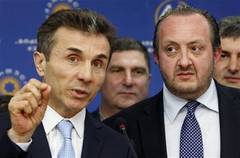Rifts Emerge Within the Georgian Dream Coalition
President Margvelashvili somewhat reluctantly responded to Ivanishvili. He said, the GD leader’s criticism was unpleasant and painful. Nevertheless, Margvelashvili declined to discuss with reporters what he referred to as “private conversations” between the two men (Channel 1 TV, March 19).
Margvelashvili’s falling out with Ivanishvili, his onetime mentor, is a striking turn of events in Georgian political life. Prior to his election, Margvelashvili was a virtual political unknown, having been plucked from obscurity and catapulted into the presidency by Ivanishvili himself (see EDM, July 26, October 21, 2013; Civil.ge, October 27, 2013). By choosing Margvelashvili, Ivanishvili hoped to cultivate a loyal person within the office of head of state. But barely five months after the October 2013 elections, the two men already find themselves on opposing sides of a political dispute, which is bound to seriously undermine Ivanishvili’s ability to influence the Georgian political system from behind the scenes.
Even more so, the Margvelashvili-Ivanishvili dispute presents the first serious test for the new Georgian constitution, which transformed the country from a semi-presidential into a parliamentary republic (http://parliament.ge/index.php?option=com_content&view=article&id=180&Itemid=85&lang=en). Although the president’s powers were greatly limited, he still retains the authority to frustrate the work of the parliament and the government. The veto power over the parliament’s laws is one of those constitutional powers maintained by the president. Even though Margvelashvili claimed that he is maintaining good working relations with the government (Channel 1 TV, March 19), his earlier veto of the bill on witness questioning proves that he is willing to use his authority as he sees fit. This will not only strain relations among the different branches of the government, but may also create political instability in the country—something that crisis-stricken Georgia can ill afford.
Moreover, the disagreement between Margvelashvili and Ivanishvili is the first serious blow to the unity of the GD coalition. However, this is not all. On March 18, another key GD member, the political party National Forum (NF), declared that it might leave the coalition. NF leader Gubaz Sanikidze harshly criticized the GD parliamentary majority and most of the cabinet members for being “inept.” He said that only a very few people in the current parliament and the government truly cared about Georgia’s problems and were working to solve them. Moreover, Sanikidze revealed existing differences within GD over Georgia’s foreign policy orientation. In particular, he called on the GD government to decide what to do, in the aftermath of the Russian onslaught on Ukraine, if Moscow offered to return to Tbilisi the occupied Abkhazia and Tskhinvali region (South Ossetia) in exchange for membership in the Eurasian Union; and he asked the government what it would do if the West offered Georgia North Atlantic Treaty Organization (NATO) membership without the occupied territories (Versia, March 18; press.mediamall.ge, for.ge, March 19). Sanikidze complained that nobody in GD thought about these pressing questions, bluntly concluding that he is contemplating his own party’s departure from the coalition.
Clearly, the rift within GD is widening. Margvelashvili’s spat with his former patron will certainly weaken Ivanishvili’s personal grip on the Georgian political system. Additionally, it could result in a political stalemate among the different branches of power. Overall, the Margvelashvili-Ivanishvili dispute and NF’s anticipated departure will fracture the coalition’s unity and accelerate further defections. Eventually, GD’s disintegration will end its monopoly on political power in Georgia, consequently, opening the way for new political forces. It is yet to be seen, however, if GD’s disintegration will be chaotic, thus causing new instability in Georgia, or if it will be peaceful, sparing the country from another political crisis.

